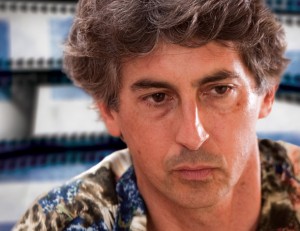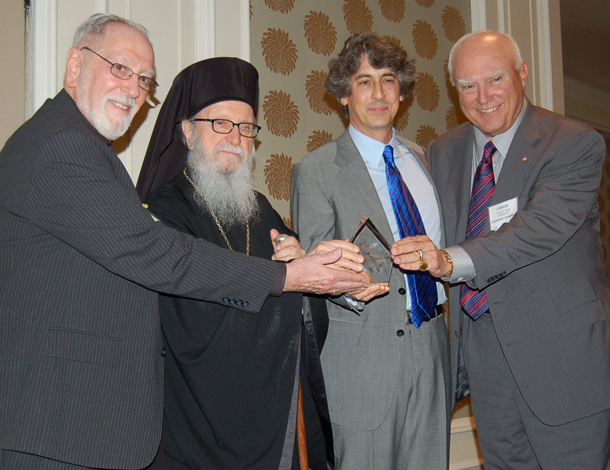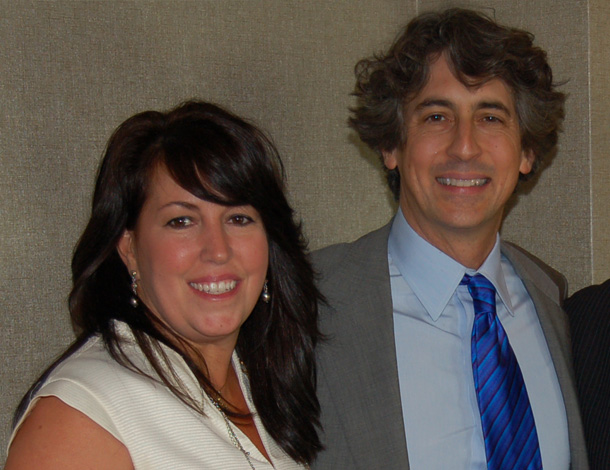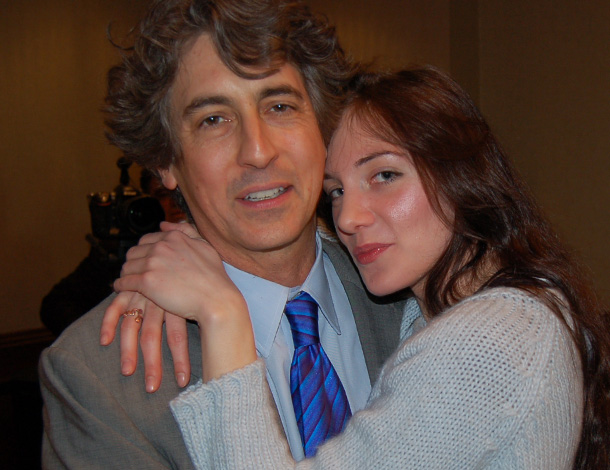Film Director Alexander Payne: Greece ‘energizes my DNA!’

Alexander Payne
Alexander Payne plans to visit Greece this June, as soon as he finishes the film he’s currently working on, “Nebraska”, a father-and-son story taking place in his home state. Payne was born and raised in Omaha, the son of Peggy and George Payne, restaurant owners (his grandfather anglicized the last name from Papadopoulos). He is the youngest of three sonsand grew up in the same neighborhood as billionaire Warren Buffett!
In an interview with NEO magazine at the Leadership 100 Conference, where he was one of the main speakers, (Constantine) Alexander Payne said that one of his future endeavors entails him going to Greece, staying there for a while, honing his linguistic skills, and using “my movie camera as a way to tell a Greek story and in doing so find out more about myself”. (It makes sense for the additional reason that if he weren’t a film director he would have liked to be “a foreign correspondent”.) He also feels that the negative criticism Greece is suffering these days “is energizing my DNA! When I hear things about Greece, I feel, I can say that, you can’t say that! I can say bad things about Greece if I want, but you shut up!” (Here’s your answer Mitt Romney!)

Archbishop Demetrios and Charles H. Cotros, Chairman of L100, joined by Fr. Eugene Pappas, far left, present Archbishop Iakovos Leadership 100 Award for Excellence to Alexander Payne, second from right, Photo: ETA PRESS
Although he feels that in modern American cinema “the intelligent comedy has been lost and the intelligent drama has been lost”, he’s happy with the outcome this year, both nationally and internationally: “See the film ‘Amour’. That’s a masterpiece! It’s very beautiful to see a masterpiece created in our time.”
Payne attended Stanford University where he double majored in Spanish and History. In 1990 he got his MFA from the UCLA Film School. He then worked in various capacities on films and television before he wrote and directed his first full-length film, “Citizen Ruth” in 1996. His film “Election”, starring Matthew Broderick and Reese Witherspoon, which deals with partisan politics and education, was named by film critic David Denby the best movie of 1999 and Payne was nominated for an Academy Award in Writing Adapted Screenplay.
In 2000 he did an uncredited polish of the screenplay for the comedy hit “Meet the Parents” and in 2001 he wrote a draft of “Jurassic Park III”. In 2003 he received a Golden Globe for his “About Schmidt” screenplay which was also nominated for a Writers Guild of America Award for Best Adapted Screenplay. He then won both the Academy Award and Golden Globe in 2005 for Best Screenplay for “Sideways,” which also won the Golden Globe Award for Best Motion Picture – Musical or Comedy.
He became a member of the Board of Governors of the Academy of Motion Picture Arts and Sciences (Directors Branch). Payne also served as an executive producer on the films “King of California” and “The Savages”. He returned to directing in 2011, after a seven year hiatus, with the film “The Descendants”, starring George Clooney. He also co-wrote the screenplay, winning the Oscar.

Here with home town, Omaha, chef and culinary author Stephanie Patsalis, Photo: ETA PRESS
Your project in the making is called “Nebraska”. What is it about? How was it shooting in your hometown?
This film will be my first in black and white and I’m a big film buff. I would say 95% of the movies I watch are black and white and I always wanted to make one. It’s a very simple story, a father and son road trip from Montana to Nebraska. It’s a very modest little comedy, but I didn’t actually shoot it in my hometown of Omaha, rather in the rural areas of my State of Nebraska. I have no idea if it’s any good or not, but it will be out this fall.
You‘ve been many times to Greece, including as guest of honor in movie festivals, but you haven’t shot a movie there. Is there something in the offing?
It’s a little bit dangerous for me to mention this because I have no concrete plans, but I have growing within me the urge to move to Greece, not permanently but for a while, learn Greek well, finally, and use my movie camera as a way to tell a Greek story and in doing so find out more about myself.
What could Greece do to attract more filmmakers?
I’m not really the right guy to answer this question because I’m not a producer, I’m not a financier, I’m not a businessman, I ‘m just an artist. But I do know tax incentives can be good, bureaucracy will be fun to deal with in Greece, and then the other thing that I know filmmakers need to shoot on a lower budget in a specific place, is the presence of a trained crew: that you have local technicians who can be hired to work on your film and not to have to pay their hotels and per diem. Rumania has that, the Czech Republic has that, London has that, France has that, obviously, Italy, Spain. But I don’t know how deep the pool will be in a smaller country like Greece.
Are you planning to visit the country anytime soon?
As soon as I finish this film I’m going to Greece, probably in June.
What part of Greece did your family come from?
My family is from three different areas: the island of Syros, from Livadia and also, with whom I’m most in touch, from Aegio.
For the last three years Greece has endured an onslaught of negative publicity. Whether she deserved it or not, isn’t that enough of a reason to want to make a movie there?
Look, I am a Greek-American, but I’m an American. However, this crisis affecting Greece I feel is energizing my DNA. When I hear things about Greece, I feel, I can say that, you can’t say that! I can say bad things about Greece if I want, but you shut up! It doesn’t necessarily help or cure anything but it helps somewhere. I just think it’s the right time for artists including those Greek artists of the Diaspora to make beautiful things and do so somehow with the consciousness of being Greek and helping Greece in mind. Now that sounds kind of vague. I don’t know exactly what that means, even though I’m saying it, but I stick by it!
You were one of the main speakers at the Leadership 100 conference. How would you describe that experience?
Eight months ago I hadn’t even heard of L100, so now to come to this group I was nervous about what I would say, I didn’t know what the atmosphere in the room was going to be like, but everyone has been extremely friendly, lovely, and I’ve seen lots of people I know like Greeks from Nebraska, and we are many, it’s been really great. Especially after my main talk, I spoke to some younger people, some questions and answers, and I always think that’s extremely important, more important than the larger talk.
At the same conference, Jim Gianopulos, President of the 20th Century Fox, said that you are somehow the new John Cassavetes.
If he means that I’m merely the newest, the latest known Greek-American director, or if he means that there exists a thematic or humanistic similarity, well, I am proud of the fact that the two Greek American directors who preceded me, Elia Kazan and John Cassavetes, both were great humanists and interested in the intricacies of the human heart as I aspire to be.
Which one of your movies is your favorite?
I don’t have a favorite among my films but I would tell you that the film I received the most compliments on is “Election”. I think, and I like that film in this aspect, I think it’s the only film I made which isn’t too long. The other films are good, but are a little bit too long and even as I was making them I was thinking, oh it’s a little too long, but there is nothing else I could cut at this point. “Election” has very good rhythm, it moves along like a shark and it ends at just the right point.
In your opinion, what’s the state of the American cinema today?
I can only give a subjective answer the type of movies that I want to see. In general, the intelligent comedy has been lost and the intelligent drama has been lost. They all are making Roger Corman films now: cops, car chases, guns, science fiction. They don’t want to spend $15 million on a small human movie. They’d rather spend $115 million on a big one and get a big turn. I’m fine with that! Look, a movie can be anything. I want someone alone in his tiny apartment making a film about his cat and I want the big film about outer space. But not at the expense of that middle section that many of us want to become filmmakers in the first place, which is literate dramas and comedies. However, this year has been a good year, an excellent year! That we have “Silver Linings Playbook”, “Argo”, “Zero Dark Thirty” and a bunch of others, it’s a pretty good year for films. And also internationally it’s been a good year. And I forgot to mention for younger people to see the film “Amour”. That’s a masterpiece! It’s very beautiful to see a masterpiece created in our time.
As someone who creates spectacle through your camera, your characters, without many technological tricks, how do you think your genre, the classic filmmaking that you do, will evolve, because I think it hasn’t much?
The BBC made a series 15 years ago with a very ugly English nun explaining art. And she became a hit. Her name was Sister Wendy and her program on the BBC and later in America was called “Sister Wendy Explains Art to You”. They would fly her around the world and she would stand in front of different sculptures, paintings and explain them with profound, prodigious intelligent insight. She began the series in southern France, standing in front of those cave paintings of the guys hunting, which are beautiful, and she said, we will see art like this from now to our own contemporary times. I like science where each generation stands on the shoulders of the generation before to have progress. Art does not have progress. Art simply shifts given the time in which it’s created. Because the human heart does not progress it merely shifts, given the time in which it is born. That’s how I feel about your question. In the ‘30s honest film looks and feels on the surface different from what it was in the ‘70s, ‘80s, even now. But underneath its form, it’s the exact same humanism and compassion and exploration of the human heart.
Would you go to unexplored waters, by doing a 3D movie, more CGI?
If the story is good. The form doesn’t matter, it’s the story and who are the people.
What did you mother tell you after you dedicated to her your latest Oscar and in Greek!
You know, my mother is funny! On the one hand she is a little unsentimental; on the other hand, when I received the (first) Oscar, seven years previous, she had said “you didn’t mention me. You should have dedicated it to me just like Javier Bardem did with his mother!” So, in a way the fact that I did it was, OK good, now we can move on.
You made your first movie when you were thirty. Did you ever consider the idea of stopping and doing something else, like your parents suggested?
No I never thought about stopping, I love movies too much.
What kind of other jobs did you do until success came?
I graduated from the UCLA Film School with a hit student film and within a month of graduation I was offered a writing/directing deal at Universal Studios, where I could write anything I wanted and if they want it I would direct it. I was paid for that $125,000 of which because of taxes, agent and lawyer, you keep about half. So, that was about $60,000 which I lived on for five years because I never changed my lifestyle from that of a student. And then I did a couple of film jobs and also, during film school, I worked as a catering waiter.
If you hadn’t become a director, what profession would you have chosen?
When I was a senior in university and applying to graduate film school, I was also applying to journalism school. I would have been also very happy, maybe not as happy, but who knows, as a foreign correspondent.

Alexander Payne with friend, actress Anna Rezan-Kritselis, Photo: ETA PRESS
Anastasios Papapostolou from The Greek Reporter contributed to this interview.
Wikipedia was used as source for biographical info.















0 comments